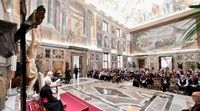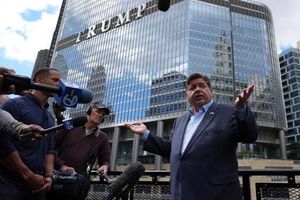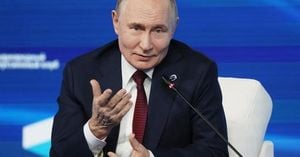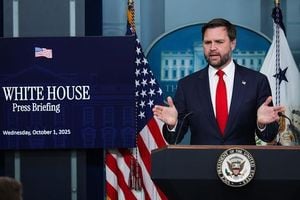In the heart of Rome, as the autumn air buzzed with anticipation, leaders from across the globe gathered for a conference that aimed to reshape the way the world views migrants and refugees. Held from October 1 to 3, 2025, the event, titled "Refugees and Migrants in Our Common Home," was more than just another summit. It marked the beginning of a three-year global initiative, rooted in the belief that hope and reconciliation can transform not only individuals but entire communities.
Pope Leo XIV, whose personal journey began at Villanova University—the very institution that organized the conference—welcomed participants to the Vatican’s Sala Clementina on October 2. According to the Catholic News Service, he described migrants and refugees as "privileged witnesses of hope through their resilience and trust in God." The Pope’s words echoed through the ornate halls, resonating with scholars, religious leaders, and advocates from all walks of life.
The conference was a collaborative effort, co-sponsored by Villanova University, the U.S. bishops, and several Vatican dicasteries, including those for Promoting Integral Human Development and for Culture and Education. The U.S. bishops' Migration and Refugee Services also played a pivotal role. The timing was no accident: the gathering took place just before the Jubilee of Migrants and the Jubilee of Missions, celebrated worldwide on October 4 and 5. This alignment underscored the urgency and spiritual significance of the conversation.
As Pope Leo XIV addressed the group, he set the tone for what would become a defining theme of the summit. "Your time together begins a three year project with the goal of creating ‘action plans’ focusing on four core pillars: teaching, research, service and advocacy," he said, as reported by ZENIT News. With characteristic candor, he challenged attendees to integrate two guiding themes into their work: reconciliation and hope. "Just as Pope Francis spoke of the culture of encounter as the antidote for the globalization of indifference, we must work to confront the globalization of powerlessness by fostering a culture of reconciliation."
The Pope’s call to action was not merely theoretical. He urged participants to "propose concrete ways to promote gestures and policies of reconciliation, particularly in lands where there are deep-seated wounds from long-standing conflicts." He acknowledged the challenges ahead, admitting, "This is no easy task, but if efforts to work for lasting change are to succeed, they must include ways to touch hearts and minds." The message was clear: real change requires more than policy shifts—it demands empathy, courage, and a willingness to see the humanity in every person.
In a poignant moment, Pope Leo XIV encouraged his audience to "lift up such examples of hope in the communities of those whom you serve. In this way, they can be an inspiration for others and assist in developing ways to address the challenges that they have faced in their own lives." The Pope’s words highlighted the moral and spiritual dimensions of migration, reminding listeners that the stories of migrants are not just tales of hardship, but of unwavering faith and resilience.
The event also marked the official launch of Villanova University’s Mother Cabrini Institute on Immigration. The institute, led by Professor Michele R. Pistone, aims to promote scholarship, advocacy, and service to migrants both on campus and in the broader community. Pistone, inspired by both Pope Francis and Pope Leo XIV, told Catholic News Service, "Welcoming the stranger is a central tenet of our faith. Today, that call for welcome is made loudly, clearly. Pope Leo XIV is reminding us to witness the humanity in each person, to encounter each human, made in the image of God, for it is only through encounter that humanity will reconcile. He teaches us that encounter leads to reconciliation and understanding."
Art, too, played a role in the proceedings. During the Vatican audience, world-renowned artist Timothy Schmalz presented Pope Leo XIV with a one-meter-tall sculpture titled Peace be with you all. The piece, inspired by the Pope’s own words and St. Augustine’s famous line, "Our hearts are restless until they rest in you," depicted the Holy Spirit sheltering the world with peace. Schmalz explained, "When Pope Leo announced himself to the world it was an announcement of world peace. This sculpture celebrates his hope. Pope Leo XIV has made it clear, his mission is to bring peace upon this world—the sculpture is a visual ambassador of that hope."
At the heart of the conference was the recognition that migration is one of the defining challenges of our era. Pope Leo XIV praised the Mother Cabrini Institute’s goal of addressing the plight of over 100 million people affected by migration and displacement worldwide. He reminded participants that overcoming the "globalization of powerlessness" requires "patience, a willingness to listen, the ability to identify with the pain of others and the recognition that we have the same dreams and the same hopes."
Sister Norma Pimentel, executive director of Catholic Charities of the Rio Grande Valley in Texas, offered a powerful perspective during the conference. She described migrants as "missionaries of hope to us, because their presence with us honestly sanctifies who and where we are." Addressing the often contentious political climate, she criticized the 2024 U.S. presidential election campaign for spreading what she called the false message that migrants are "invaders that come and take over our land and destroy our America and take our jobs." She urged political leaders—including President Donald Trump—to meet migrants personally: "Please come and see them. Please see their faces. Please see these families that are directly affected by your decisions and your laws and how you feel you must proceed to be as president."
Sister Pimentel’s message was one of compassion and courage. "In this Jubilee Year of Hope, we are called to find within ourselves kindness and compassion and courage, especially courage," she said. She acknowledged the "unprecedented assault on humanity worldwide," but, quoting Bishop Daniel E. Flores of Brownsville, reminded the audience, "We may not have the power to stop the injustices that are destroying our communities. But we do have the power to love. We can be neighbors to those living in fear and who are afraid to go to work or even to go to the supermarket." She concluded, "No government can stop us from living out our faith and caring for our refugee brothers and sisters."
The conference’s agenda was ambitious. By mobilizing academic institutions around the world and focusing on teaching, research, advocacy, and service, organizers hope to create lasting, action-oriented responses to migration. The gathering at the Istituto Patristico Augustinianum in Rome was just the beginning. As the summit concluded on the eve of the Jubilee of Migrants, participants left with a renewed sense of purpose—and a clear mandate to carry the torch of hope and reconciliation into their own communities.
In a world often divided by fear and uncertainty, the voices that rang out in Rome this October offered something different: a vision of unity, rooted in faith, and sustained by the belief that every encounter can be a step toward healing.




